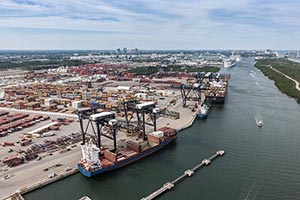Port Everglades Cancels Signing of Pact With Cuba After Gov. Scott Threatens to Cut Funding

After Gov. Rick Scott threatened to financially cut off Florida ports that do business with Cuba, Port Everglades in Fort Lauderdale canceled its plans to sign an agreement with Cuba.
Broward County Commissioner Chip LaMarca told the Miami Herald on Jan. 26, minutes after speaking with port director Steve Cernak, that Cernak told him the memorandum of understanding with Cuba won’t be signed. However, LaMarca said that port officials still will hold their scheduled meeting with the Cuba delegation at the port in Fort Lauderdale on Jan. 26.
“The port director was a little upset with the way things transpired. Nevertheless, he understood the governor’s position,” LaMarca said. “With respect to the MOU, it was canceled yesterday afternoon [Jan. 25], once the governor’s position was made. They are going to still have the meeting.”
RELATED: TIA delegation travels to Cuba to explore resumption of trade
Port Everglades sent a brief e-mail to reporters on the morning of Jan. 26:
“The National Port Administration of Cuba has indicated to Port Everglades administration that there is no need for a memorandum of understanding at this time. However, today’s business meeting and related activities will continue as planned.”
Port leaders could not be reached for comment.
Scott revealed Jan. 25 on Twitter that he would ask state lawmakers to restrict funding for ports that “enter into any agreement with [the] Cuban dictatorship.” Port Everglades planned to do so Jan. 26, and the Port of Palm Beach on Jan. 27.
“I will recommend restricting state funds for ports that work with Cuba in my budget,” Scott tweeted.
The Port of Palm Beach, which is in Riviera Beach, did not immediately react to Port Everglades’ decision.
Scott issued his funding threat a day after the first legal cargo from Cuba in more than 50 years arrived in Port Everglades. The containers carried hardwood charcoal made by private work cooperatives, which are allowed only under rules issued by former President Barack Obama in his quest to normalize relations with Cuba.
Broward County Administrator Bertha Henry underscored to the Herald in an e-mail that the meeting with the Cuban delegation was still scheduled Jan. 26. The seven-member delegation planned an all-day visit.
“Members of administration (port staff, in particular) will be joining members of the business community at the meeting today with the Cuban delegation in support of our major cargo tenant, notwithstanding the governor’s tweet,” Henry wrote.
The delegation already has paid visits to ports in Houston and New Orleans and plans on dropping in on the Port of Palm Beach, Port Tampa Bay and the Port of Virginia in Norfolk before returning to Cuba in early February.
The port’s deal with the National Port Administration of Cuba was in the works since early 2016 and ready to sign since May.
Trade with Cuba is hardly new for Florida ports. Under exceptions to the embargo that allow food and other humanitarian exports to Cuba, the United States has exported more than 4,806,368 metric tons of products to the island since 2010.
Of that amount, more than 737,155 metric tons have been transported from ports located in Florida, said John Kavulich, president of the U.S.-Cuba Trade and Economic Council. This volume represents more than 15% of the total transported since 2010.
LaMarca said that Crowley Maritime Corp., the Port Everglades tenant that brought in the cargo of artisanal Cuban charcoal during the week of Jan. 23, has shipped goods under a humanitarian agreement with the federal government since 2001. That arrangement will continue.
The port has MOUs with five other ports around the world.

